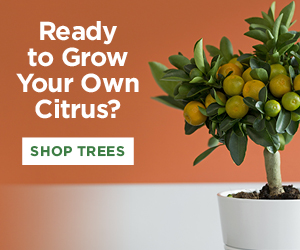Lime and lemon trees are both members of genus Citrus and many of them have thorns. However, the presence of thorns on lime and lemon trees is natural and no cause for alarm. In truth, the evolution of thorns on citrus trees, like those on Key lime and Meyer lemon trees, is very similar to that of animals like porcupines and hedgehogs – for protection. Thorns protect the delicate juvenile lime lemon tree from hungry animals that want to eat away at the tender leaves and fruits. As citrus trees grow and mature some lose their thorns while some retain them.
Some of the factors that contribute to your lemon tree being thorny are (1) Variety, (2) Rootstock, and (3) Canopy Sprouts.
Best Lemon Tree
When deciding which are the best lemon trees to plant in your backyard when you have limited space, know the trees’ characteristics to determine which tree fits your needs.
- Dwarf Eureka Lemon Tree – the Eureka Dwarf Lemon tree is a nearly thornless lemon variety that grows well in pots and can be brought inside the house during cold months. This tree is open-branching, requires very minimal pruning and the typical dwarf eureka lemon tree size is around 6 feet. The large, rounded fruits produced by this tree are juicy with a strong acid flavor. If you are wondering where to get a Dwarf Eureka Lemon tree for sale, check out the local citrus nursery and see if they are growing this variety.
- Bearss Lemon Tree – if you have little kids at home and are particular to thorns, you may want to plant Bearss Lemon trees as they produce very few thorns when compared to other lemon or lime tree varieties. The standard tree requires a little bit more space as it can reach 12 up to 18 feet tall and 16 feet wide. However, you can also grow a dwarf version if you have limited space at home. Fruits produced by this tree are juicy with a sharp tartness best used for making beverages, desserts, and flavoring meats.
- Ponderosa Lemon Tree – this variety is a chance seedling from a pomelo and citron hybrid first discovered around the 1880s. This slow-growing tree can reach up to 24 feet in heigh but tend to be smaller when planted in a pot. You can also get a Dwarf Ponderosa Lemon tree for sale and the fruits produced will still be the size of grapefruit with taste and juiciness just like a lemon. Furthermore, Ponderosa Lemon trees are prized for ornamental plants as they produce white, purple-tinged blooms and yellow fruits at the same time.
- Cocktail Lemon Tree – can’t decide if you want to grow lemon or lime tree? Well, you are not the only one having this dilemma. The good news is you can now grow limes and lemons from the same tree with the Citrus Cocktail tree. This tree is the perfect combination of Meyer Lemon and Key Lime. What makes this the best type of lemon tree to grow in limited space is its small size, you get 2 types of fruits on a single tree, it is cold hardy, and is pest and disease resistant. With this type of citrus tree, you now get to enjoy the best of both worlds.
Lemon tree Disease and Treatment
Like all other trees, citrus trees like lemons may contract diseases which may cause the tree to decline and die. It is best to know the common citrus tree diseases, how to prevent them, and the proper treatment to be applied.
- Citrus canker is a bacterial infection that is spread through the air. Affected trees have halo-like lesions on fruits, leaves, and twigs. This disease may be prevented by spraying liquid copper fungicide on lemon trees. Unfortunately, once your lemon tree has been infected by this disease, there is no treatment available and the tree must be destroyed to prevent any further spread of the disease.
- Anthracnose is a fungal infection caused by Colletotrichum and common after prolonged periods of rain. It causes twig dieback, premature falling of leaves and stained fruits. Pruning limbs so they don’t touch the ground can help prevent this. Infection may be treated with a fungicide.
- Phytophthora or root rot is caused by a fungi pathogen that thrives in damp conditions and causes the loss of feeder roots underground and stunted tree growth aboveground. Prevention includes the use of mulch for lemon tree and copper fungicide spray. The best mulch for lemon trees are organic choices like wood chips and bark. If your lemon tree has been infected, the lesions caused by the fungi need to be cut away using sharp, sterilized tools then treated with copper fungicide.
Now that you know more about lemon trees, you can make a wise and informed decision as to which lemon tree is the best for you.

